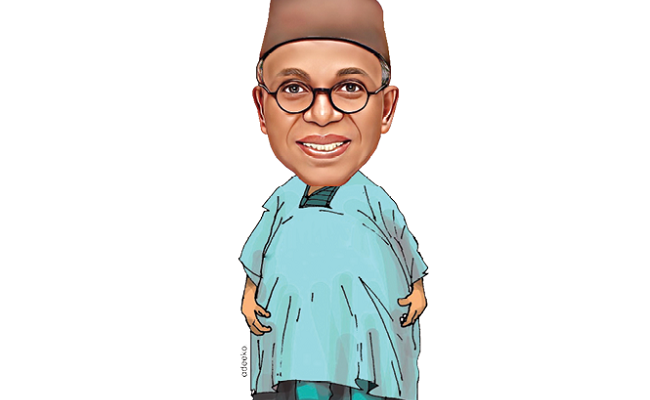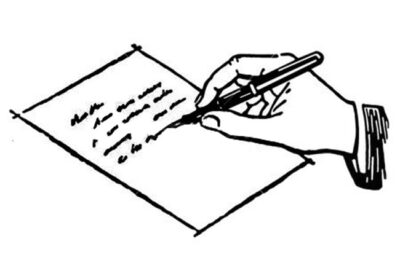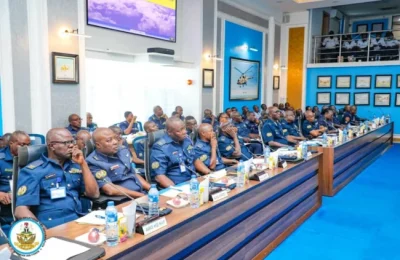
With: Abiodun Awolaja
IN the latest statement pointing to the widening gulf between the Muhammadu Buhari presidency and the camp of Senator Bola Tinubu, the All Progressives Congress (APC) presidential candidate, the Kaduna State governor, Malam Nasir El-Rufai, asked Nigerians to stop depositing their old naira notes in banks, promising that Tinubu would reverse the Central Bank of Nigeria’s (CBN) naira redesign policy if elected Nigeria’s next president on February 25. The governor stated this in a town hall meeting with leaders of markets in Kaduna State on Tuesday. His words: “Continue running your businesses and daily activities with whatever notes (old or new) you have. Don’t rush yourself into taking old naira notes to the bank, and wasting your time in the unnecessary queues at the bank. Nobody can stop you (people) from using the notes. When we come to power, if Tinubu becomes the president, we’ll give people more time to get rid of the old naira notes.” To a Twitter user wondering if he actually made the statement attributed to him, the governor said on his verified Twitter handle: Yes. I, Nasir @elrufai made the commitment and stand by it. Those intent on impoverishing citizens through pea-brained policies of sabotage against our nation and democratic rights will not only fail, but will be held to account in this world & hereafter. So there!!!”

Because Nigerians are in one of their worst moments since the return to civil rule in 1999 and with tempers quite high, there are those who may link el-Rufai’s statement with the temper of the moment. With most ATMs not dispensing cash, with cheques not being honoured and with Point of Sales (PoS) vendors making a kill with extravagant charges dictated in large part by their own struggles with the system, incendiary statements and crazy actions such as stripping naked in banking halls or cooking on banking grounds have become routine. However, to those familiar with el-Rufai’s persona, Tuesday’s declaration would have come as no surprise. Speaking on Channels TV this week, the governor doubled down on his earlier position on the naira redesign policy, categorically chalking it up to the antics of a cabal within Aso Villa. He said: “Nigerians should understand that these are not the policies of the APC. They are not the policies of our candidate. They are the policies of fifth columnists that want to bring us down. They want to bring this country down.”
If el-Rufai has been literally on fire all week, it is not just because of the mounting tension in town. Since bursting on the political scene/stage, the Kaduna helmsman has been controversial. As Minister of the Federal Capital Territory (FCT), he courted controversy with the demoliton of structures to actualise the “Abuja masterplan” and as governor, he has literally swum in the waters of controversy. Only last week, he stoked the ire of former Minister of Sport and Youth Development, Barrister Solomon Dalung, when he declared that the 19 Northern governors were the real elders in the North. He had said: “I am also an elder; I will be 63 years old this year, 2023, so who are the elders in the North? We, the Northern governors, are the elders, and we are the leaders of the North. Age does not indicate being responsible.” And Dalung returned fire: “Political leadership can never displace the elders of any society. The North is a traditional society; there are elders and traditional rulers; the political leadership depends solely on guardianship from the elders.” Dalung then panned the “over ambition exhibited by these crops of governors who have failed to discharge their mandate and abandoned governance to the challenge of insecurity, poverty, and unemployment, and are so reckless in their utterances.”
And even the most generous critic of the governor’s ways would have been shell-shocked by his declaration on Tuesday. For one thing, regardless of his opposition to the naira redesign policy, it is a policy rolled out by the APC government. For another, not being the President and Commander-in-Chief, is his statement not openly asking Kaduna State residents and, by implication, all Nigerians to undermine the CBN policy? For all his powers as the Kaduna State governor, Nigeria’s laws are sufficiently clear on the custodian of the mandate to determine what is or is not legal tender. The governor knows that only the CBN is empowered by law to determine Nigeria’s legal tender, yet he advised traders, some of whom may not be literate, to defy government policy. If either President Buhari or the CBN Governor, Godwin Emefiele, had issued a statement reaffirming the February 10 deadline for phasing out the old N1,000, N500 and N200 notes, the traders that the governor addressed would have been in serious confusion.
Nonetheless, some respite came their way with the Supreme Court’s order on Wednesday temporarily halting the CBN’s deadline, following an application brought by three APC-controlled states, namely Kaduna, Kogi and Zamfara. Hours after the ruling, the Federal Government, through an application brought by the Attorney-General of the Federation (AGF) and Minister of Justice, Abubakar Malami (SAN), asked the apex court to dismiss the suit challenging the deadline set by the CBN. It said that the Supreme Court lacked jurisdiction to hear the suit filed by three northern states, being not a dispute between the federation and the state governments. It said the suit is not qualified to be taken directly to the Supreme Court for adjudication, and ought to have commenced at the Federal High Court.
el-Rufai can also point to the position of the International Monetary Fund (IMF) calling for the extension of the February 10 deadline “in light of hardships caused by disruptions to trade and payments due to the shortage of new bank notes available to the public” as a validation of his position. In doing that, however, he would have ignored Law 1 of the celebrated 48 laws of Power: never outshine the master. Buhari being still the President and Commander-in-Chief, el-Rufai’s seeming attempt as a member of the Tinubu camp to garner pity in the eyes of hard-hit and long-suffering Nigerians while making the president look bad can backfire spectacularly. For one thing, it puts the president in the position of a lameduck leader who does not know what is good for Nigeria. If members of the opposition can describe the president in these terms, members of the APC, especially those on the echelon of power at which el-Rufai operates, cannot do so without expecting a presidential pushback. This is because when all pretence is shelved, the naira redesign policy rolled out to curb electoral heist is first the president’s policy before it is the CBN policy. History and logic point to the fact that if the policy did not have the president’s buy-in, it would not have lasted a week. Two, by pointing to a cabal within the party/Villa as the architect of the policy, el-Rufai inadvertently robes the president in the garb of a villain. If the naira redesign policy that the president has spoken so glowingly about is the work of a cabal, what does that make the president?
Third, by asking Kaduna people to continue using old notes after undergoing brutal torture as part of their personal sacrifices for the policy, the Kaduna governor is suggesting that the harrowing experiences that they have been through in the past few weeks was all for nothing. In their reactions so far, Nigerians no longer hold the old notes in any esteeem. That is why the notes were reportedly rejected as payment for a bride price in a northern state. In other words, what Nigerians want is sufficient access to the new notes, not mixed use of old and new notes. Indeed, the Civil Society Central Coordinating Council, the apex body of all civil society groups in Nigeria, has rejected the exparte order made by the Supreme Court and called on President Buhari to immediately consider issuing Executive Orders to bring to effect the policy terminal date. Arguing that the Supreme Court order did not restrain the president’s exercise of his constitutional powers, the council said the order was an attack on credible elections, calling on the apex court not to yield its platform “for election riggers to have access to illicit cash to compromise the election.”
Fourth, and perhaps most significantly, el-Rufai’s wholesale condemnation of the policy aimed at curbing vote buying and therefore instituting a better leadership recruitment process is grim in portent. He puts the president in a very difficult position. And the situation worsens when it is realised that he is speaking the mind of a principal who is not yet in power and giving the impression that a Tinubu presidency would be hostile to a post-Buhari presidency.
If history proves anything, it is the fact that no president wants a successor who will openly rubbish his policies, particularly those acknowledged as having the potential to turn things around politically and economically.







